Do you have a hard time bringing people to your real estate website? Do you want to boost your online presence and attract more potential clients? Search engine optimization (SEO) is the solution!
Having a strong SEO strategy is essential for any business, especially in the competitive world of real estate. By implementing these 10 real estate SEO tips, you can increase your website traffic, improve your local search rankings, and ultimately generate more leads for your business.
So let’s dive into the importance of SEO for real estate and how you can optimize your website to stand out from the crowd.
SEO Tips for Real Estate Websites
When it comes to real estate SEO service, there are a few key tips that can make all the difference in boosting your website traffic and increasing your online visibility.
First and foremost, keyword research is essential for optimizing your content and targeting the right audience.
Using tools like Google AdWords or SEMrush, you can identify high-volume keywords related to your industry and use them strategically throughout your website.
Another important aspect of real estate SEO is optimizing your title tags and meta descriptions.
These elements provide a brief summary of what users can expect from each page on your site, so it’s crucial to include relevant keywords while also making them appealing enough to click through.
Using header tags effectively is another way to improve the user experience on your website while also signaling to search engines what content is most important.
Be sure to use H1 tags for main headings, followed by H2 or H3 tags for subheadings as needed.
Optimizing images on your site with descriptive file names and alt text can also help boost SEO by providing additional context about what each image represents.
Creating quality content that answers common questions or addresses pain points for potential clients will not only improve engagement but also increase the likelihood of ranking higher in search results pages (SERPs).
The Importance of SEO for Real Estate
As a real estate professional, you know how important it is to stand out in a crowded market. With so many agents and agencies vying for the attention of prospective clients, having a strong online presence is more critical than ever before.
That’s where SEO comes in. By optimizing your website and content for search engines, you can increase your visibility online and attract more visitors to your site.
And as we all know, more visitors means more potential leads.
But SEO isn’t just about driving traffic to your site – it’s also about providing value to your audience.
When you create high-quality content that answers their questions and solves their problems, they’re much more likely to trust you and turn into loyal customers.
Another benefit of SEO for real estate professionals is that it helps establish credibility within the industry.
When people see that you’re appearing at the top of search results for relevant keywords, they’ll perceive you as an authority on the topic, which can lead to even greater success down the line.
In short, if you’re not actively working on improving your website’s SEO, you’re missing out on a huge opportunity to grow your business online.
So start incorporating these tips into your strategy today!
Pros and Cons of SEO
SEO, short for Search Engine Optimization, is the practice of optimizing your website to rank higher in search engine results pages.
Like any marketing strategy, SEO has its pros and cons.
89% of homebuyers use Google to search for properties.
Increased visibility is one of SEO’s main advantages. By ranking high on search engines like Google, you can attract more visitors to your website.
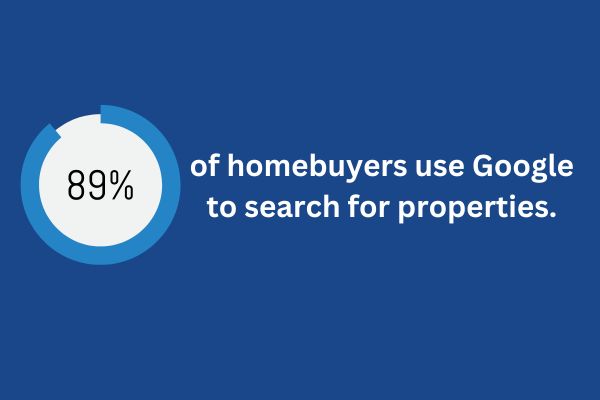
However, one disadvantage of SEO is that it takes time to see results.
Unlike paid advertising where you can see immediate traffic boosts, SEO requires patience and consistent effort before seeing significant improvements in search engine rankings.
Another pro of using SEO is cost-effectiveness.
While there may be some upfront costs associated with hiring an expert or investing in tools, once a solid foundation is built it’s possible to maintain high rankings without spending as much money as paid advertising.
On the flip side, one con of relying solely on organic traffic through SEO is that algorithm changes from search engines can greatly impact your rankings overnight.
It’s important to diversify your marketing efforts so that if something does happen with algorithm updates you’re not left scrambling for new ways to drive traffic.
While there are both advantages and disadvantages when it comes to utilizing SEO tactics for real estate websites – the key thing to remember is that a well-rounded approach including other forms of digital marketing will likely yield better long-term results than relying solely on just one tactic alone.
10 Real Estate SEO Tips
1. Do Your Keyword Research
When it comes to real estate SEO, keyword research is one of the foundational steps that can make or break your website’s success.
Keyword research involves understanding what terms and phrases people are searching for when looking for properties or real estate services online.
To start with, use a keyword research tool like Google’s Keyword Planner and SEMrush to find relevant keywords with high search volume and low competition.
Once you have a list of potential keywords, narrow down your selection by focusing on long-tail keywords that are more specific to your niche.

Another way to refine your keyword list is by analyzing the intent behind each search term.
For example, if someone searches for “homes for sale,” they may be in the early stages of their home-buying journey.
On the other hand, if someone searches for “real estate agent near me,” they likely need immediate assistance from an agent.
It’s also important to consider local SEO when conducting keyword research for real estate websites.
Including location-specific keywords such as city names or neighborhoods can help attract traffic from potential clients in those areas.

Taking the time to do thorough keyword research is essential in ensuring that your website attracts quality traffic and ranks well on search engine results pages (SERPs).
2. Make your title tags and meta descriptions more effective
Optimizing your title tags and meta descriptions is a crucial aspect of SEO for real estate websites.
Title tags are the clickable headlines that appear on search engine results pages (SERPs), while meta descriptions provide a brief summary of what the page is about.

To optimize your title tags, make sure they accurately reflect the content of each page, include relevant keywords, and entice users to click through to your website.
Keep them concise – around 50-60 characters is ideal – so they don’t get truncated on SERPs.
Meta descriptions should be around 155-160 characters long and provide an overview of what users can expect to find on the page.
Include relevant keywords here too, but avoid keyword stuffing or making it sound unnatural. A well-written meta description can improve click-through rates from SERPs.

It’s also important to ensure that each page has unique title tags and meta descriptions.
This helps search engines understand what each page is about and avoids duplicate content issues that could harm your SEO efforts.
Don’t forget about branding in your title tags and meta descriptions.
Including your company name or other brand elements can help build recognition among potential clients who see you in search results pages.

3. Use Header Tags Effectively
Header tags are an important aspect of on-page SEO that help both search engines and users understand the structure of your content.
By using header tags effectively, you can improve the readability and organization of your content while also signaling to search engines which information is most important.
When creating header tags, it’s important to use them in a logical order from H1 (the main heading) down to H6 (subheadings).
This helps both users and search engines understand the hierarchy of your content.

In addition to using header tags in a logical order, it’s also important to include relevant keywords within them.
However, don’t overstuff your headers with too many keywords as this can be seen as spammy by search engines.
Another way to effectively use header tags is by making sure they accurately reflect the topic or section of content they introduce.
Avoid using clickbait-style headers that don’t accurately represent what follows in the text – this will only frustrate users who were expecting something different based on the title.
By following these tips for using header tags effectively, you’ll not only improve your website’s SEO but also provide a better user experience for visitors looking for specific information on your site.
4. Optimize Your Images
Optimizing your images is an essential step in improving your real estate website’s SEO.
Large and unoptimized images can slow down your website, leading to a poor user experience, which in turn affects your search engine rankings.
To optimize your images, start by compressing them without sacrificing their quality.
There are several tools available online that you can use to compress the file size of your images before uploading them to your website.

Another important factor is naming the image files appropriately. Use descriptive and relevant filenames that include keywords related to the image or the content on the page where it will be placed.
This will not only help search engines understand what the image is about but also make it easier for users to find relevant information on your site.
Alt tags are another crucial element when optimizing images for SEO. These tags provide alternative text descriptions of an image for accessibility purposes but also serve as another opportunity for including relevant keywords related to the content on that specific page.
Ensure that you use responsive design techniques so that all of your website’s visuals look great regardless of device or screen resolution.
By following these tips and optimizing all of the images on each page, you’ll enhance both user experience and assistive technology access while simultaneously boosting traffic from organic search results.
5. Create Quality Content
Creating quality content is one of the most important aspects of SEO for real estate websites. High-quality, informative and engaging content can help you attract more visitors to your website and keep them coming back for more. This can lead to higher search engine rankings, increased traffic and ultimately more leads.
When creating content for your real estate website, it’s important to focus on providing value to your audience.
This means writing articles that are relevant, informative and interesting. You should also make sure that your content is well-written, free from errors and easy to read.

Image Source: Brand Glow up
Another key element of quality content is relevance. Your articles should be tailored to the needs and interests of your target audience.
For example, if you specialize in luxury homes or commercial properties, you may want to write about topics such as interior design trends or business expansion strategies.
Don’t forget about multimedia elements such as images and videos. Including visual aids in your articles can make them more engaging and memorable for readers.
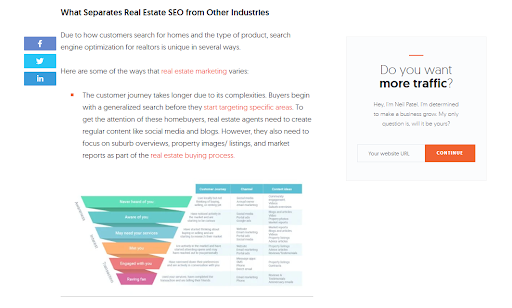
By focusing on creating high-quality content that meets the needs of your target audience, you’ll be well on your way towards building a successful real estate website with strong SEO performance.
6. Implement Schema Markup
Schema markup is a code that you can add to your website pages, which helps search engines understand the content of your pages better.
It’s an essential part of SEO for real estate websites because it allows Google and other search engines to display rich snippets that provide more information about your business.
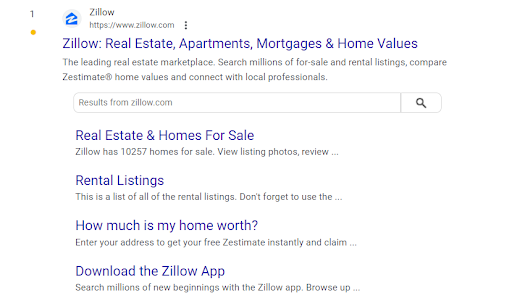
Using schema markup is also crucial if you want to show up in local search results, as it provides information like your address, phone number, and hours of operation.
To implement schema markup on your site, start by identifying the most important data points you want to highlight.
This could include things like property type (house or apartment), location (city or neighborhood), and amenities (pool or gym).
Once you’ve identified these data points, choose the appropriate schema type from Schema.org and begin adding the necessary code to each page where this information appears.
It’s worth noting that implementing schema markup does require some technical know-how.
If you’re not comfortable with coding, consider hiring a professional web developer who specializes in SEO for real estate websites like yours.
7. Optimize for Local Search
Optimizing for local SEO for real estate websites. Local SEO is all about making sure your website appears in relevant search results when people look for properties within a specific area. You can improve your website for local search by following the advice in the following list:
Firstly, ensure that your website has accurate and up-to-date contact information, including the name, address and phone number (NAP) of your business.
This will make it easier for potential clients to find you through online directories.
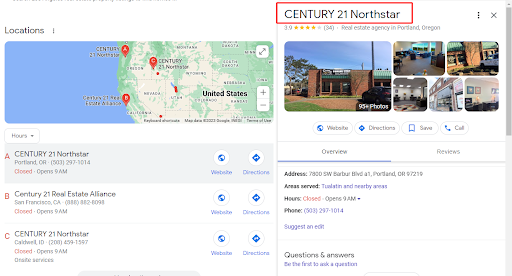
Secondly, consider creating location-specific landing pages on your website which feature targeted keywords related to the area or neighborhood you serve.
This way, users searching for properties in that particular location will have a higher chance of finding you.
Thirdly, focus on building high-quality backlinks from other reputable websites in the same geographical region as yours.
These links can improve the credibility and authority of your site in local search rankings.
Make sure that your Google My Business page is fully optimized with complete information about your business such as hours of operation and photos of available listings.
By following these tips, it’s possible to boost visibility among potential clients looking specifically for properties within their desired locations.
8. Promote Your Content
Promoting your content is a crucial step in boosting your real estate website traffic. Once you have quality content, it’s important to get the word out there and drive more visitors to your site.
One effective way to promote your content is through social media platforms such as Facebook, Twitter, and LinkedIn.
Share your blog posts or articles on these platforms with an engaging caption that will entice readers to click through and read more.
Another method of promoting your content is by reaching out to other websites and blogs within the real estate industry.
You can offer guest posts or collaborations where you share each other’s content on various channels.
Email marketing campaigns are also highly effective for promoting new content updates.
Email subscribers who are interested in real estate topics may be eager to read any fresh insights that you provide consistently.
Consider investing in paid advertising methods such as Google AdWords or Facebook Ads.
These services allow you to target specific demographics based on location, interests, behaviors, etc., increasing the visibility of your website among potential clients looking for properties online.
Promoting high-quality real estate-related content can only improve web ranking and increase organic search results.
9. Increase Your Social Shares
One of the most effective ways to boost your website traffic is by increasing your social shares. Social media platforms like Facebook, Twitter, and Instagram are great channels to promote your real estate business and engage with potential clients.

To increase social shares, you need to create shareable content that resonates with your audience. This means creating visually appealing images or informative infographics that are relevant to their interests.
You can also encourage social sharing by adding social media sharing buttons on all pages of your website.
These buttons make it easy for visitors to share your content on their own networks.
Another way to increase social shares is by running contests or giveaways exclusively for those who follow you on social media. By offering incentives such as discounts or free consultations, you can motivate people to share your posts and spread the word about your business.
Don’t forget about influencer marketing – partnering with influencers in the real estate industry can help expose your brand to a wider audience and boost engagement on social media platforms.
Focusing on increasing your social shares can go a long way in boosting traffic and building brand awareness for your real estate business.
10. Monitor Your Results
After implementing all the necessary SEO strategies, it is important to monitor your website’s performance regularly.
This will help you identify what works and what doesn’t work for your real estate website.
One of the best tools to use in monitoring your results is Google Analytics. It provides valuable insights on various aspects such as traffic sources, bounce rates, page views and more. With this information, you can make informed decisions on how to improve your real estate SEO strategies further.
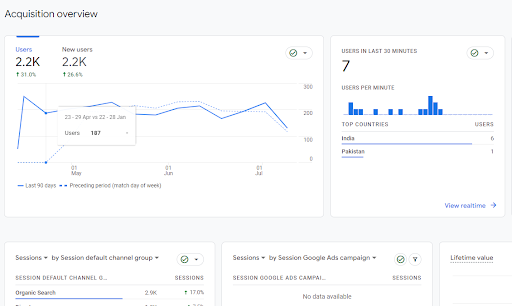
Another metric that you should keep an eye on is the conversion rate. It measures how many visitors have turned into leads or customers after visiting your site.
By monitoring this metric closely, you can determine which pages or content are most effective in converting visitors into leads.
It is also essential to track your keyword ranking positions regularly. Keyword rankings indicate where your website ranks on SERPs (search engine result pages) for specific keywords related to real estate services.
Monitoring these positions allows you to assess whether or not there has been a significant improvement from past efforts.
Remember that tracking results take time and patience – don’t expect instant improvements overnight! However, with consistent tracking and analysis of metrics over time, you will be able to refine and optimize your real estate SEO strategy until it becomes a powerful tool that drives traffic consistently toward your website without any major issues!
How to Implement Real Estate SEO Tips?
Now that you have learned the essential SEO tips for real estate websites, it’s time to implement them. But where do you start?
Here are some ways to help you put these tips into action.
Firstly, make sure to do your keyword research and incorporate those keywords in your website content.
This includes optimizing your title tags and meta descriptions with relevant keywords.
Using header tags effectively can also improve your website’s visibility on search engines.
Organize your content using H1, H2, and H3 tags as they indicate the hierarchy of importance of each section.
Optimizing images is just as important as optimizing text-based content. Make sure image file names include descriptive words related to the property or location.
Creating quality content consistently is key to keeping visitors on your site longer which ultimately leads to more traffic from search engines.
Implement schema markups such as local business schema or product schema depending on what type of real estate services you offer.
Local search optimization will greatly increase online presence within a specific geographic area by incorporating local information in website copy and building citations online
Promote blog posts through email marketing newsletters, and social media channels like Facebook groups focused around specific niches (i.e rental properties) etcetera)
Monitor results regularly using Google Analytics so any changes can be made quickly if needed!
Conclusion
In the current digital era, any real estate business must have a strong internet presence to be successful. SEO can be a powerful tool in driving more traffic and leads to your website, but it requires consistent effort and dedication.
By following these 10 real estate SEO tips, you’ll be on your way to boosting your website traffic and improving your search engine rankings.
Remember to always stay up-to-date with the latest trends and best practices in SEO.
Implementing these tips may take time and effort, but the results will be worth it when you see an increase in website visitors and ultimately, sales.
So start optimizing your real estate website for search engines today!

